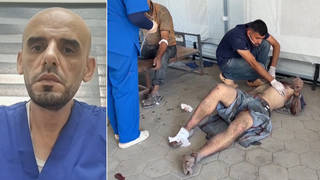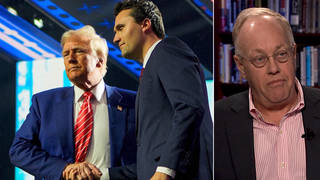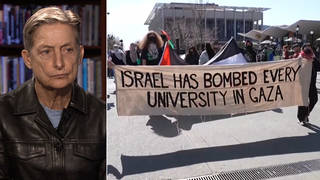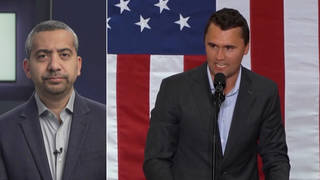
Sportswriter Dave Zirin, author of A People’s History of Sports in the United States, says the New Orleans Saints’ Super Bowl appearance — at least for the moment — is boosting spirits in New Orleans on a level unseen since Hurricane Katrina. Zirin also discusses pro athletes who have stood up for gay rights and how the Super Bowl spectacle continues to be used to promote US militarization. [includes rush transcript]
Transcript
AMY GOODMAN: We’re going to continue, though, now with Dave Zirin, sports columnist, author of a number of books about politics and sports. His latest is A People’s History of Sports in the United States.
Dave, talk about the other issues that you’ve been following, as well as around the Super Bowl, though not particularly this ad against abortion.
DAVE ZIRIN: Yeah, this ad almost takes all the oxygen out of the room, which is too bad, because there’s a terrific story about the relationship between the city of New Orleans and the rise of the New Orleans Saints. I mean, count me as somebody who’s a serious skeptic when it comes to all those stories about how a team is lifting a city out of its doldrums, like when the Detroit Tigers made their run last year, and people were saying, “Oh, it’s lifting up the city in the context of the recession.” A lot of that is hooey. It’s absolute hooey. It’s used to fill copy in the sports pages. But with New Orleans, it really is different.
I’m a big believer that sports is like a hammer, and you could use a hammer to build a house or bash somebody over the head. And this is one of those cases where sports is really speaking to the best angels of people’s nature in New Orleans.
I was speaking to Malik Rahim, who I know you’ve had on your show before, a former Black Panther Party member, someone who has been a community activist in New Orleans for thirty years. And I asked him about the role that the Saints are playing in the city. And I expected Malik to be a bit of a skeptic about it. But Malik said to me, “I haven’t seen people in the Ninth Ward or in Algiers this happy since Katrina. And I haven’t seen African Americans and working-class whites talk to each other so much in all three decades since I’ve lived in New Orleans.” And I think it’s really helped by the fact that, more than any other team in the NFL, players who play for the Saints, post-Katrina actually live in the city and are part of the rebuilding effort in the city. So there’s a real connection there between team and city that, honestly, you just don’t see anymore.
JUAN GONZALEZ: And Dave, you’ve been involved in plans for a Super Bowl party that has an anti-militarism theme. Could you talk about this whole issue that you alluded to earlier of the involvement of the military in Super Bowls?
DAVE ZIRIN: Oh, yeah. Well, that’s the whole funny thing about, “Oh, we can’t have advocacy ads for the Super Bowl.” But last year David Petraeus flipped the coin at the Super Bowl. Every year, you have the fighter planes fly overhead. It’s a huge recruitment day for the US armed forces. And particularly in the context of the war on terror, the Super Bowl has been an absolute center for military recruitment on a year-in, year-out basis.
And this year I’m teaming up with the Iraq Veterans Against the War, IVAW, and we’re actually going to have a Super Bowl party at the IVAW house here in Washington, DC, where we’re going to watch the game, without question, but we’re also going to speak about de-linking the fun of football with the reality of war. Far too often, sports is used as this idiotic metaphor for war — quarterbacks are field generals, and they throw bullet passes or bombs — when in reality we know that war is very different. War is life and death. War is long periods of boredom punctuated by horrifying terror. So, if you want to just watch the game and have fun watching the game but also speak out against militarism, please email me, dave(at)edgeofsports.com, and I’ll hook you up at the IVAW house here in Washington, DC to watch the big game.
AMY GOODMAN: What about New Orleans Saints player Scott Fujita, who you profiled?
DAVE ZIRIN: I mean, this has just been a terrific thing for me to see Scott Fujita get a lot of attention over the last couple of weeks, just because the Saints are in the Super Bowl. Scott Fujita is a linebacker, went to Cal Berkeley. He also is adopted by Japanese parents. He’s a Caucasian guy, big blonde guy, six-five, 260. His family is Japanese, his adopted family. And his father was actually born in a Japanese internment camp, and his grandparents were interned, as well.
And so, when the war on terror started, Scott Fujita started to speak out against Dick Cheney, against the secret prisons, because he spoke about what happened to his parents. He went public to ESPN and said, “Look, we had internment camps in this country. We cannot have this again. That’s not what this country needs to be about.” And so, Scott spoke out against that, and so I developed a political relationship with Scott.
And when the National Equality March was called for this past fall, 200,000 people marching in DC for LGBT rights, I contacted a whole bunch of athletes to see if one of them would sign on to call for people to come to DC and march, and Scott responded without hesitation and said, “Absolutely.” And he did an interview with me, where he spoke about how set he is that gay marriage should be a right for everybody, for all LGBT people, and that LGBT equality should be something that cannot wait. And Scott was very brave in speaking out for that, because oftentimes I think we see the pro sports locker room as being the last acceptable hamlet of homophobia. And so, to have Scott Fujita and another player on the Baltimore Ravens, Brendan Ayanbadejo, speak out for LGBT rights and marriage rights and civil rights, that made a huge difference. So I just have a lot of affection for Scott, and I love the fact that he’s getting noticed and profiled by all these big newspapers, because he deserves it.
JUAN GONZALEZ: Dave, I’d like to ask you about another topic relating to football. It got a lot of attention a few months ago, and it potentially is perhaps the biggest scandal in the National Football League and in football, in general, which is the issue of head injuries, two ballplayers and permanent brain damage, and how the NFL sought to basically ignore the problem for years. But it has enormous implication for children in high school and college sports, as well.
DAVE ZIRIN: You know, a player, a former player, Dave Meggyesy, once said to me that when you sign an NFL contract, you sign away your right to have a middle age. And it is true. You meet players who are in their mid-thirties, and they speak openly about the fact that when they’re in their mid-forties they might not be able to communicate with their wife and kids the way they once could. I’m thinking of Andre Waters, who was a star safety for the Philadelphia Eagles, who committed suicide at age forty-five, and when they did an autopsy, he had the brain tissue of an eighty-eight-year-old with Alzheimer’s. This is very real. And the NFL has tried to sweep it under the carpet for decades.
And yet, players are getting faster, players are getting stronger. And ironically, the more they make the helmets, quote-unquote, “safer,” the more dangerous it gets, because players feel like they can be more reckless and launch themselves at other players. So, it’s a very difficult situation.
Malcolm Gladwell, the author of so many bestselling books, like Blink, he wrote in The New Yorker that maybe someday we would look back at professional football like dog fighting and see it as something that should be outlawed, just because of the sheer level of carnage that it puts on the brain. Yet we all know that the NFL is by far the most popular sport in the United States, and it’s not going anywhere.
So, the NFL has a real problem on its hands. They need to figure out a way to deal with this, whether it’s through equipment or a change in the rules, because if it keeps going like this, I think they’re in for some serious problems.
AMY GOODMAN: Dave Zirin, we want to thank you very much for being with us, sports columnist, author of a number of books. His latest, A People’s History of Sports in the United States.
AMY GOODMAN: And Dave, who are you rooting for in the game on Sunday?
DAVE ZIRIN: Oh, are you kidding me? Go Saints! Who dat?!












Media Options